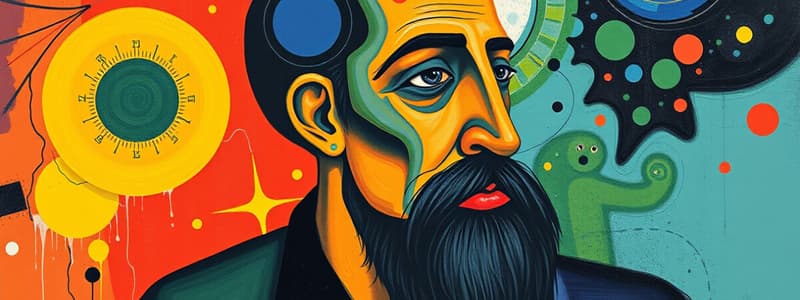Podcast
Questions and Answers
What nationality did the character identify with?
What nationality did the character identify with?
- American
- Argentinian (correct)
- Uruguayan
- Swiss
In what year and city did the characters discuss their encounter?
In what year and city did the characters discuss their encounter?
1969, in the city of Cambridge
The character in Geneva claimed to be younger than Borges.
The character in Geneva claimed to be younger than Borges.
False (B)
What proof does Borges offer to convince the other that he is not lying?
What proof does Borges offer to convince the other that he is not lying?
What was one of the books mentioned in the closet?
What was one of the books mentioned in the closet?
What is the fate of Borges's father mentioned in the dialogue?
What is the fate of Borges's father mentioned in the dialogue?
What conclusion does the narrator reach about his encounter with the other?
What conclusion does the narrator reach about his encounter with the other?
The narrator feels tormented by the memory of the encounter.
The narrator feels tormented by the memory of the encounter.
Flashcards are hidden until you start studying
Study Notes
Recognition and Identity
- The narrator meets a man claiming to be Jorge Luis Borges in Geneva, raising questions about identity.
- Dialogue reveals a connection to shared locations, emphasizing the peculiarity of their meeting.
- The year is 1969, and the setting is Cambridge, enhancing the surreal nature of their encounter.
Personal Artifacts as Evidence
- The narrator provides specific details about personal items as proof of his identity, such as:
- A silver mate container with a snake foot, brought from Peru.
- Specific books in the man's room, including Lane's Thousand and One Nights and a Don Quixote from Garnier.
Dream Theory and Existence
- The younger Borges questions the validity of the narrator's claims, debating if their conversation is just a dream.
- They discuss the nature of dreams and reality, contemplating the obligation to accept either as true.
- The young Borges expresses anxiety about the nature of their dreamlike encounter.
Family Background
- The older Borges shares details about family:
- His mother is alive and well, while his father passed away approximately thirty years prior.
- Illustrates a personal connection that adds depth and emotion to their interaction.
Memory and Forgetting
- The younger Borges challenges the older on the concept of forgetting, specifically regarding a forgetful encounter from 1918.
- The older Borges reflects on the difficulty of this memory and suggests the strangeness of the experience could lead to unconscious forgetting.
Conclusion and Reflection
- The older Borges concludes that their meeting was real, but there are layers of consciousness involved:
- One talked to the other in a dream state, and the waking Borges struggles with the memory of the encounter.
- This duality raises questions about perception, memory, and the nature of reality itself.
Studying That Suits You
Use AI to generate personalized quizzes and flashcards to suit your learning preferences.




